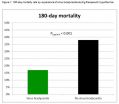INFORMATION:
Something in the way we move
Queen's researcher Nikolaus Troje reveals the way we walk actually affects our mood.
2014-10-20
(Press-News.org) Being depressed is depressing in itself and makes you feel even worse. That is one reason why it is so hard to break out of depressive conditions.
New research out of Queen's University offers a new approach to do just that. Nikolaus Troje (Psychology, Biology and School of Computing) along with clinical psychologists from the University of Hildesheim, Germany, have shown that walking in a happy or sad style actually affects our mood. Subjects who were prompted to walk in a more depressed style, with less arm movement and their shoulders rolled forward, experienced worse moods than those who were induced to walk in a happier style.
"It is not surprising that our mood, the way we feel, affects how we walk, but we wanted to see whether the way we move also affects how we feel," says Dr. Troje.
Dr. Troje presented the participants of the study with a list of positive and negative words, such as "pretty," "afraid" and "anxious" and then asked them to walk on a treadmill while the researchers measured and analyzed gait and posture in real time. While walking, participants were looking at a gauge whose reading depended on the result of this analysis – namely if their gait appeared to be rather happy or rather sad as indicated by features such as slump-shouldered (sad) or vertical bouncing (happy). Participants didn't know what the gauge was measuring. They were simply asked to make the gauge deflect from the neutral position. Some had to try to move the gauge left, while others were told to move it right.
Both participant groups quickly learned the task. Afterward, they had to write down as many words as they could remember from the earlier list of positive and negative words. Those who had been walking in a depressed style remembered many more negative words. The difference in recall suggests that the depressed walking style actually created a more depressed mood.
"Clinically depressed patients are known to remember negative events," says Dr. Troje, "particularly those about themselves, much more than positive life events. Remembering the bad can make them feel even worse. If we can break that self-perpetuating cycle, we might have a strong therapeutic tool to work with depressive patients."
ELSE PRESS RELEASES FROM THIS DATE:
Rapid agent restores pleasure-seeking ahead of other antidepressant action
2014-10-20
A drug being studied as a fast-acting mood-lifter restored pleasure-seeking behavior independent of – and ahead of – its other antidepressant effects, in a National Institutes of Health trial. Within 40 minutes after a single infusion of ketamine, treatment-resistant depressed bipolar disorder patients experienced a reversal of a key symptom – loss of interest in pleasurable activities – which lasted up to 14 days. Brain scans traced the agent's action to boosted activity in areas at the front and deep in the right hemisphere of the brain.
"Our ...
Fairness is in the brain
2014-10-20
Ever wondered how people figure out what is fair? Look to the brain for the answer. According to a new Norwegian brain study, people appreciate fairness in much the same way as they appreciate money for themselves, and also that fairness is not necessarily that everybody gets the same income.
Economists from the Norwegian School of Economics (NHH) and brain researchers from the University of Bergen (UiB) have worked together to assess the relationship between fairness, equality, work and money. Indeed, how do our brains react to how income is distributed?
More precisely, ...
Goldilocks principle wrong for particle assembly: Too hot and too cold is just right
2014-10-20
Microscopic particles that bind under low temperatures will melt as temperatures rise to moderate levels, but re-connect under hotter conditions, a team of New York University scientists has found. Their discovery points to new ways to create "smart materials," cutting-edge materials that adapt to their environment by taking new forms, and to sharpen the detail of 3D printing.
"These findings show the potential to engineer the properties of materials using not only temperature, but also by employing a range of methods to manipulate the smallest of particles," explains ...
When to count the damage?
2014-10-20
The health and environmental implications of fossil fuel exploitation, nuclear waste or mining-related pollution are some of the more well-known effects of the increasing energy and material use of the global economy. One way to confront environmental injustice is to use economic evaluation tools. Environmental Justice Organisations (EJOs) are conducting cost-benefit analyses (CBAs) and multi-criteria analyses (MCA) with the support of academics, in order to explore and reveal the un-sustainability of environmentally controversial projects. In some cases, that strategy ...
Genetic variant protects some Latina women from breast cancer
2014-10-20
An international research collaboration led by UC San Francisco researchers has identified a genetic variant common in Latina women that protects against breast cancer.
The variant, a difference in just one of the three billion "letters" in the human genome known as a single-nucleotide polymorphism (SNP), originates from indigenous Americans and confers significant protection from breast cancer, particularly the more aggressive estrogen receptor–negative forms of the disease, which generally have a worse prognosis.
"The effect is quite significant," said Elad ...
Blind cave fish may provide insight on eye disease and other human health issues
2014-10-20
Blind cave fish may not be the first thing that comes to mind when it comes to understanding human sight, but recent research indicates they may have quite a bit to teach us about the causes of many human ailments, including those that result in loss of sight. A team of researchers, led by Suzanne McGaugh, an assistant professor in the University of Minnesota's College of Biological Sciences, is looking to the tiny eyeless fish for clues about the underpinnings of degenerative eye disease and more. A new study, published in the October 20 online edition of Nature Communications, ...
Head Start program benefits parents
2014-10-20
Head Start programs may help low-income parents improve their educational status, according to a new study by Northwestern University researchers.
The study is one of the first to examine whether a child's participation in the federal program benefits mothers and fathers – in particular parents' educational attainment and employment.
"Studies on early childhood education programs have historically focused on child outcomes," said study lead author Terri Sabol, an Assistant Professor of Human Development and Social policy at Northwestern's School of Education ...
Heart rate may predict survival and brain function in comatose cardiac arrest survivors
2014-10-20
Geneva, Switzerland – 20 October 2014: Researchers may have developed a way to potentially assist prognostication in the first 24 hours after out-of-hospital cardiac arrest (OHCA) when patients are still in a coma. Their findings are revealed today at Acute Cardiovascular Care 2014 by Dr Jakob Hartvig Thomsen from Copenhagen, Denmark.
Acute Cardiovascular Care is the annual meeting of the Acute Cardiovascular Care Association (ACCA) of the European Society of Cardiology (ESC) and takes place 18-20 October in Geneva, Switzerland.
Dr Thomsen said: "When we talk ...
Study shows medication is frequently, unintentionally given incorrectly to young children
2014-10-20
According to Nationwide Children's Hospital researchers, 63,000 children under the age of six experienced out-of-hospital medication errors annually between 2002 and 2012. One child is affected every eight minutes, usually by a well-meaning parent or caregiver unintentionally committing a medication error.
The most common medication mistakes in children under the age of six occur in the children's home, or another residence and school. The most common medicines involved are painkillers and fever-reducers like ibuprofen and acetaminophen.
"This is more common than people ...
Mummy remains refute antiquity of ankylosing spondylitis
2014-10-20
Ankylosing spondylitis is a systemic disease that causes inflammation in the spinal joints and was thought to have affected members of the ancient Egyptian royal families. Now a new study published in Arthritis & Rheumatology, a journal of the American College of Rheumatology (ACR), refutes that claim, finding instead a degenerative spinal condition called diffuse idiopathic skeletal hyperostosis (DISH) in royal Egyptian mummies from the 18th to early 20th Dynasties.
Ankylosing spondylitis is a member of a group of inflammatory conditions called the spondyloarthropathies ...
LAST 30 PRESS RELEASES:
Emerging class of antibiotics to tackle global tuberculosis crisis
Researchers create distortion-resistant energy materials to improve lithium-ion batteries
Scientists create the most detailed molecular map to date of the developing Down syndrome brain
Nutrient uptake gets to the root of roots
Aspirin not a quick fix for preventing bowel cancer
HPV vaccination provides “sustained protection” against cervical cancer
Many post-authorization studies fail to comply with public disclosure rules
GLP-1 drugs combined with healthy lifestyle habits linked with reduced cardiovascular risk among diabetes patients
Solved: New analysis of Apollo Moon samples finally settles debate about lunar magnetic field
University of Birmingham to host national computing center
Play nicely: Children who are not friends connect better through play when given a goal
Surviving the extreme temperatures of the climate crisis calls for a revolution in home and building design
The wild can be ‘death trap’ for rescued animals
New research: Nighttime road traffic noise stresses the heart and blood vessels
Meningococcal B vaccination does not reduce gonorrhoea, trial results show
AAO-HNSF awarded grant to advance age-friendly care in otolaryngology through national initiative
Eight years running: Newsweek names Mayo Clinic ‘World’s Best Hospital’
Coffee waste turned into clean air solution: researchers develop sustainable catalyst to remove toxic hydrogen sulfide
Scientists uncover how engineered biochar and microbes work together to boost plant-based cleanup of cadmium-polluted soils
Engineered biochar could unlock more effective and scalable solutions for soil and water pollution
Differing immune responses in infants may explain increased severity of RSV over SARS-CoV-2
The invisible hand of climate change: How extreme heat dictates who is born
Surprising culprit leads to chronic rejection of transplanted lungs, hearts
Study explains how ketogenic diets prevent seizures
New approach to qualifying nuclear reactor components rolling out this year
U.S. medical care is improving, but cost and health differ depending on disease
AI challenges lithography and provides solutions
Can AI make society less selfish?
UC Irvine researchers expose critical security vulnerability in autonomous drones
Changes in smoking status and their associations with risk of Parkinson’s, death
[Press-News.org] Something in the way we moveQueen's researcher Nikolaus Troje reveals the way we walk actually affects our mood.



